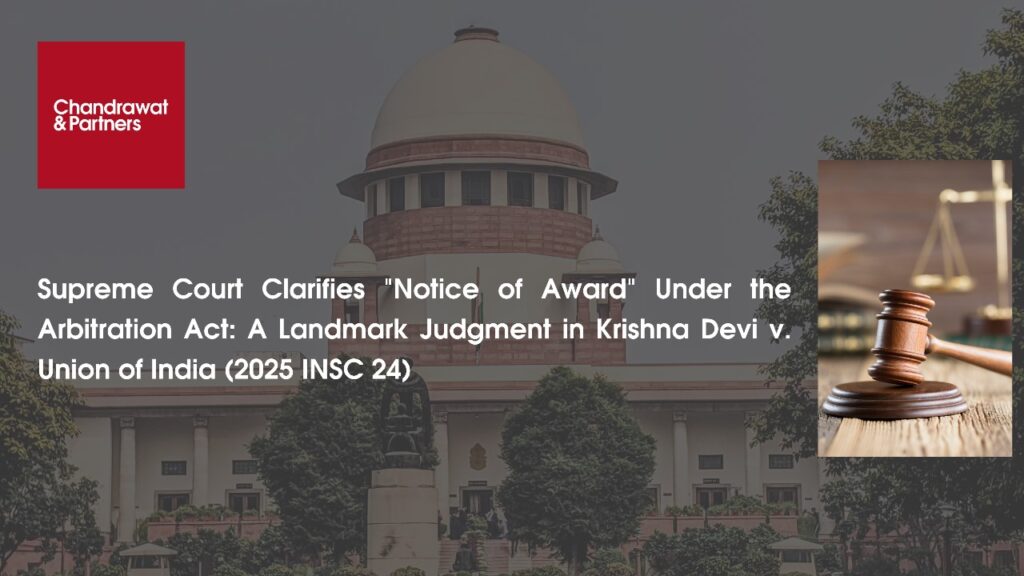Home > Recent Judgements > Supreme Court Clarifies “Notice of Award” Under the Arbitration Act: A Landmark Judgment in Krishna Devi v. Union of India (2025 INSC 24)
April 12, 2025
Supreme Court Clarifies “Notice of Award” Under the Arbitration Act: A Landmark Judgment in Krishna Devi v. Union of India (2025 INSC 24)
On 7th April 2025, the Supreme Court of India delivered a pivotal judgment in the case of Krishna Devi v. Union of India (2025 INSC 24), clarifying an important procedural aspect under the Arbitration Act, 1940 – specifically, the starting point of the limitation period for challenging an arbitral award.
This ruling has significant implications for arbitration jurisprudence in India, especially regarding how courts interpret procedural timelines in favor of justice and fairness.
The Core Issue
At the heart of the case was the interpretation of Section 14(2) of the Arbitration Act, 1940, which governs the procedure once an arbitral award is made and signed. It states that the court must give notice to the parties once the award is filed. From this point, a party typically has 30 days (as per applicable limitation law) to file objections or challenge the award.
However, the key legal question was:
“Does the limitation period for filing objections to the arbitral award begin from the date of formal notice by the court, or from the date the party gains knowledge of the award?”
The Supreme Court’s Ruling
In a well-reasoned and practical judgment, the Supreme Court held that:
- The limitation period begins when the party obtains knowledge of the award, and not necessarily from the formal notice issued by the court.
- This interpretation ensures that the parties are not unfairly prejudiced due to procedural technicalities, especially in cases where there is delayed formal notice or informal communication of the award’s filing.
- The bench emphasized that the purpose of Section 14(2) is not to blindside parties, but to ensure due process and transparency, so that a party aware of an award cannot indefinitely delay challenging it on a technicality.
The Rationale
The Court’s reasoning was rooted in three key principles:
- Substance over form: Procedural law must aid justice, not obstruct it. If a party knows the award has been made and filed, they cannot later claim ignorance merely due to lack of formal notice.
- Preventing abuse of process: This interpretation discourages litigants from using procedural loopholes to indefinitely delay the arbitration process.
- Balance of convenience: It maintains a balance between procedural discipline and access to remedy, preventing miscarriage of justice due to mere formal defects.
Legal Insight: Why This Judgment Matters
This judgment marks a shift toward a more pragmatic and justice-oriented interpretation of arbitration procedures in India. Below is why it matters:
Clarity for Litigants and Lawyers
- Litigants are now on clear notice that actual knowledge of an award triggers their obligation to act. This clarity will help legal counsel advise clients more accurately on deadlines.
Reduced Delays
- It discourages intentional delays in arbitration challenges, thereby strengthening the efficiency and finality of the arbitration process.
Alignment with Modern Arbitration Norms
- The judgment aligns with global arbitration standards, which increasingly focus on substantive fairness and efficiency, rather than rigid formalities.
Comparative Note: Modern Arbitration and Procedural Fairness
Interestingly, the Arbitration and Conciliation Act, 1996, which has largely replaced the 1940 Act in many cases, also emphasizes fairness and party autonomy. Although this case was under the 1940 Act, the Supreme Court’s interpretation hints at the judiciary’s consistent stance that procedural rights must serve substantive justice.
Conclusion
The Supreme Court’s decision in Krishna Devi v. Union of India serves as a critical precedent in Indian arbitration law. It affirms that justice must not be sacrificed at the altar of procedural technicalities. The judgment ensures that parties cannot evade their obligations by hiding behind formal delays, while also protecting the rights of parties who act in good faith upon gaining knowledge of an arbitral award.
As arbitration continues to evolve as a preferred mode of dispute resolution in India, such judgments reinforce the judicial commitment to a fair, efficient, and accessible system of justice.
For more information or queries, please email us at
enquiries@chandrawatpartners.com





